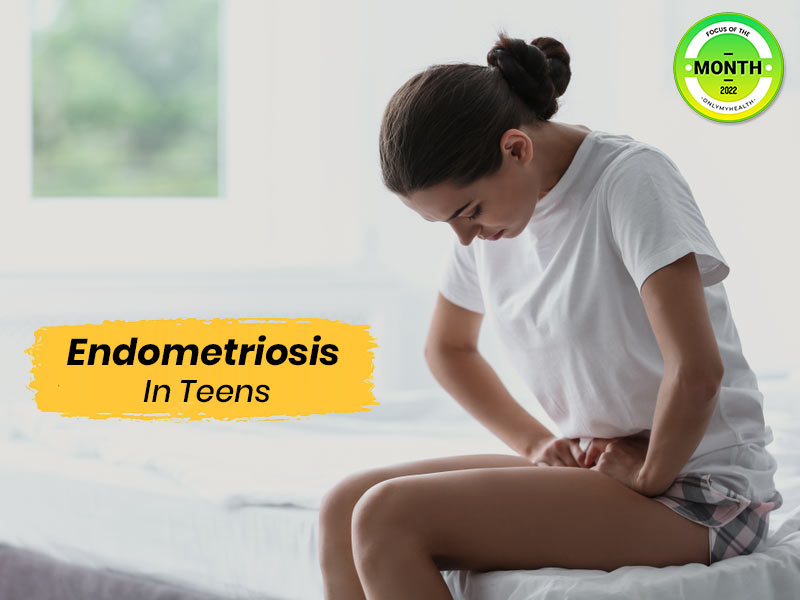
Pelvic pain is a condition that usually starts in older adults or people in their late 30s. However, some teenagers also have progression of chronic pelvic pain in their teenage years that could lead them to terrible discomfort and pain in the pelvic section. The condition is known as Endometriosis and this occurs when the lining of the uterine grows in the places beside that of the uterus. As a part of our “Healthy Living” campaign, we will be telling you more about these prevailing painful conditions so that you can be aware and take precautions against it. Although this condition is not so common in teenagers, but cases are increasing whereas teenagers and young adults are getting diagnosed for this chronic condition. Let us know about endometriosis in teenagers in detail.
Table of Content:-
Can Teenagers have Endometriosis?
We asked this question to out expert Dr. Usha Thakur, Head of Gynecology Department, in BNK Hospital, Bangalore. He explained that this is a progressive condition and may affect adolescents without them even being aware of it. Chronic pelvic pain occurs at a rapid rate in this condition and teenagers can get bad cramps. However, it becomes slightly difficult to determine because it might be similar to painful period cramps that could be similar to that in endometriosis. In the past few years, the prevalence of endometriosis has increased significantly which is a cause of concern. This tissue in the uterus lining can grow in ovaries, fallopian tubes, bowel and abdominal organ.

Endometriosis Symptoms in Teens
The symptoms in teenagers might be almost similar to what happens in adults, but there could be few additions and neglections depending on the stage of endometriosis. Here are some common symptoms that you should be aware of-
- Painful menstrual cramps
- Heavy bleeding in periods
- Irregular periods
- Bleeding in between periods
- Painful sexual intercourse
- Digestive problems that could include problems like nausea, constipation or diarrhea
- Pain during urination and bowel movements
Risk Factors Associated with Endometriosis in Teenagers
Endometriosis could occur to anyone that has a uterus, and hence it is hard to name a particular risk factor. But some individuals might still be more likely to have this condition that others because of the following reasons-
Having a family history that is related to endometriosis
- Getting heavy periods
- If the menstruation cycle starts before the age of 11 years
- Having short or irregular menstrual cycles
Also Read- Pneumonia Disease: Know Ways To Diagnose And Treat This Lung Condition
Diagnosis of Endometriosis in Teenage
If symptoms of endometriosis occur in the teenagers, then they should first consult their parents to get them into notice. If the symptoms are quite evident and repetitive, then you might be taken to a doctor.
First there are some questions in order to understand the condition that you might be in. This includes asking some questions about tracking periods, how pain feels like and if there is any painful urination or fatigue. There are also some tests that could be taken for this period-
Pelvic Exam- During a pelvic pain, a doctor might feel some cysts or scars behind the uterus. You might even have some difficultly in feeling smaller areas or affected tissues.
Imaging Test- A doctor might cause you with ultrasound imaging to check the reproductive organs and look for ovarian cysts. MRI scan might also be advised for more detailed picture of abdomen.
Medications- if there are so such signs of ovarian cysts, then hormonal birth control might be used to reduce pelvic pain and regulate periods.

Treatment for Endometriosis in Teenagers
Although there is no cure for endometriosis, there are a few treatment options that could be used to manage a person’s symptoms.
Medication- A doctor might recommend you to hormonal birth control pills. Another option is that of intrauterine device. The hormonal IUD prevents pregnancy for almost seven years, but it may not reduce the endometriosis symptoms of the entire duration.
Also Read- Labour Pain Relief: Here Are 5 Non Medical Ways To Manage
Pain medications- over the counter medications can be given in order to reduce pain of endometriosis. This includes-
- Ibuprofen
- Naproxen
- Acetaminophen
Surgery- The last option is always surgery. If other treatments are not able to provide you with relief, then a doctor might recommend you to take laparoscopy. This in minimally invasive surgery where the surgeon inserts a scope through a small incision in individual’s belly.
Picture Credits- pexels.com
Also watch this video
How we keep this article up to date:
We work with experts and keep a close eye on the latest in health and wellness. Whenever there is a new research or helpful information, we update our articles with accurate and useful advice.
Current Version
